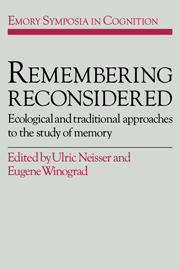Book contents
- Frontmatter
- Contents
- Preface
- List of contributors
- 1 New vistas in the study of memory
- 2 Continuities between ecological and laboratory approaches to memory
- 3 Memory for randomly sampled autobiographical events
- 4 Ordinary everyday memories: Some of the things of which selves are made
- 5 Walking in our own footsteps: Autobiographical memory and reconstruction
- 6 Memory observed and memory unobserved
- 7 The maintenance of marginal knowledge
- 8 The content and organization of autobiographical memories
- 9 The ontogeny of memory for real events
- 10 The functions of event memory: Some comments on Nelson and Barsalou
- 11 “The Wreck of the Old 97”: A real event remembered in song
- 12 Passive remembering
- 13 Remembering without experiencing: Memory for reported events
- 14 What is ordinary memory the memory of?
- 15 Go for the skill
- Name index
- Subject index
13 - Remembering without experiencing: Memory for reported events
Published online by Cambridge University Press: 25 March 2010
- Frontmatter
- Contents
- Preface
- List of contributors
- 1 New vistas in the study of memory
- 2 Continuities between ecological and laboratory approaches to memory
- 3 Memory for randomly sampled autobiographical events
- 4 Ordinary everyday memories: Some of the things of which selves are made
- 5 Walking in our own footsteps: Autobiographical memory and reconstruction
- 6 Memory observed and memory unobserved
- 7 The maintenance of marginal knowledge
- 8 The content and organization of autobiographical memories
- 9 The ontogeny of memory for real events
- 10 The functions of event memory: Some comments on Nelson and Barsalou
- 11 “The Wreck of the Old 97”: A real event remembered in song
- 12 Passive remembering
- 13 Remembering without experiencing: Memory for reported events
- 14 What is ordinary memory the memory of?
- 15 Go for the skill
- Name index
- Subject index
Summary
There is a class of real events that we know about and remember, though we have not experienced them. Learning about such events does not require clairvoyance or divine revelations, but only listening to a friend, reading a newspaper, or watching television. The fact is that we may know about real events in the world in two different ways, either by personal experience (directly, firsthand) or by the report of someone else (indirectly, secondhand). I shall call events that are known in these two ways experienced events and reported events, respectively. This chapter attempts, first, to demonstrate the pertinence of this distinction to research on real-event memory; second, to advance a theoretical analysis of memory of the two classes of events in terms of the information available to specify them; and, third, to examine some empirical results relevant to this analysis.
A little personal background is in order to set the topic and the approach in perspective. My interest in these issues stems from several years of research into memory for texts and particularly news reports (Larsen, 1983). News reports are different from the texts of most memory experiments because they are about real events and because they are important in everyday life. Therefore, news memory seemed to deserve a place in the emerging field of ecological memory research (Neisser, 1982a). But in this research the emphasis was heavily on autobiographical memory.
- Type
- Chapter
- Information
- Remembering ReconsideredEcological and Traditional Approaches to the Study of Memory, pp. 326 - 355Publisher: Cambridge University PressPrint publication year: 1988
- 21
- Cited by



